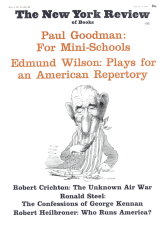In response to:
Letter from Ghana from the October 12, 1967 issue
To the Editors:
I would like to correct one false impression given in the otherwise very valuable Letter from Ghana in your issue of Oct. 12, 1967. This is that the origin of Kwame Nkrumah as a revolutionary stems from the initiative of the Ghanaian elite which went searching “for a suitable ‘boy.”‘ The article continues with, “His instructions were to organize the people solidly behind the elite….”
The facts are quite different. Nkrumah had been a student at Pennsylvania University when he met in New York C.L.R. James, the West Indian Marxist. Learning that he was going to England to study law and impressed with Nkrumah’s nationalist fervor, James gave Nkrumah a letter of introduction to George Pad-more, another West Indian with whom James had collaborated for many years in the London-based African bureau. It was with Padmore and the African bureau that Nkrumah matured as an African revolutionary. It would be impossible to identify either Padmore or James with “the Ghanaian elite.”
This is not simply a matter of correcting the facts for their own sake. A significant political and historical issue is involved. No matter what the ultimate failure of Nkrumah to maintain and develop his ties with the Ghanaian masses, it should not be permitted to conceal the truly popular and revolutionary character of the struggle for independence from England. Otherwise the events are given a manipulative cast which is both unwarranted by the facts and demeaning of the revolutionary capacity of those same Ghanaian masses.
Martin Glaberman
Detroit, Michigan
The author replies:
Mr. Glaberman is concerned with Nkrumah’s development as a nationalist and a revolutionary before his return to Ghana. The focus of my article is on the Ghanaian situation and the effect the returned Nkrumah was to have on it.
If Mr. Glaberman’s letter is an expression of regret that the story of Nkrumah’s growth and formation did not form part of my article, I can only point out that mine was a short piece with clearly defined limits, not a comprehensive work.
If, however, it is Mr. Glaberman’s contention that Nkrumah’s entry into Ghana and his employment as an organizer there were not the result of initiatives taken by the conservative leadership of the United Gold Coast Convention—specifically Messrs. Grant, Ako Adjei and Danquah—may I recommend a rereading of Nkrumah’s autobiography, Ghana? The question is quite adequately dealt with in Chapter V.
This Issue
January 4, 1968



